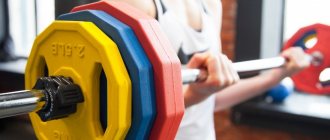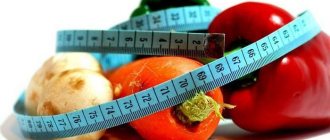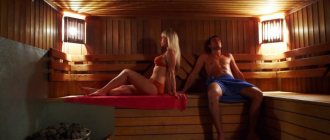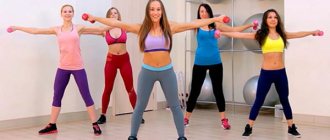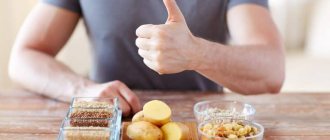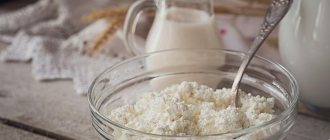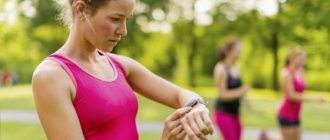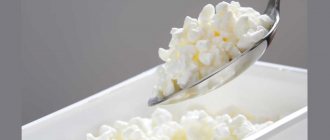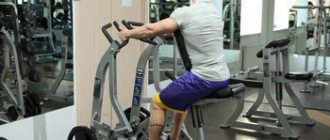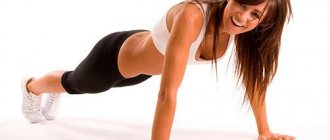It is not so important what you will eat after training and whether you will eat food at all immediately after exercising to lose weight. But if you want to lose excess fat, it is much more important to monitor your total daily caloric intake, which will determine how much and what foods you can eat before and after doing weight loss exercises.
Immediately after completing any weight loss exercises, you can eat nothing and drink plain water, as a result of which the body will take energy for recovery from fat depots, and not from food.
But if it is important for you to maintain muscle and lose weight through fat reserves, then you can drink a protein shake, BCAA amino acids or any other protein product with a small amount of carbohydrates. But the correct approach involves calculating the daily calorie intake of the correct selection of proteins, fats and carbohydrates (BJU) and changing their proportions in the diet depending on the results of the diet and training.
Below you will learn about the principles of creating an effective nutrition plan for weight loss, and get a list of foods that you can eat even before bed.
Is it possible to eat after training in the morning, at lunchtime, in the evening?
Yes, you can eat immediately after training in the morning and evening if you want to lose weight, but provided that you maintain a negative energy balance in your daily diet.
If during the day you spend more energy than you get from food, the body will look for additional sources of energy and burn reserves from fat depots. And it doesn’t matter at all whether you ate your last meal before 6 pm or just before bed, or right after the gym. If you burn more than you eat, you will lose weight. But if you eat more calories than you burn in a day, including workouts, you will gain weight.
During intense exercise, the body uses glycogen from the muscles, as well as energy from the food you ate before exercise. By the end of classes, your breathing and pulse quicken, your mouth becomes dry, your palms become sweaty because your blood sugar has dropped. Therefore, you can eat immediately after exercise if you want to lose weight, even 5 minutes after finishing exercise to raise your glucose levels. You can eat a small sweet apple, a handful of nuts, or drink a protein shake or BCCA amino acids.
After which your condition will return to normal, you will go home and after a couple of hours eat protein foods with fresh vegetables. It could be chicken breast, turkey, fish, eggs, boiled pork or baked salmon. Vegetables: tomatoes, asparagus, beets, cucumbers, radishes.
You can continue the list of products, the main thing is to avoid mistakes and choose the right diet and not exceed calorie intake. After all, no amount of gyms or pills will correct mistakes in diet planning.
Sample menu for people who play sports
Balanced nutrition after training
A balanced diet after and before training brings many benefits to the body. That is why the issue of creating a menu for every day requires a responsible approach. You can properly organize your diet by following the following menu.
| Day | Breakfast | Dinner | Dinner |
| 1st | oatmeal; yogurt; a cup of green tea. | chicken cooked in a steamer or baked in the oven; broccoli florets, steamed; a glass of orange juice. | soft-boiled eggs; tomato-cucumber salad; tea with a slice of lemon and a spoon of honey. |
| 2nd | grapefruit; potato fritters; coffee with added low-fat milk. | pollock fillet, steamed or boiled; brown rice porridge; berry drink. | vegetable salad with finely chopped boiled eggs and chopped chicken fillet, seasoned with a teaspoon of olive oil; apple compote. |
| 3rd | oatmeal; a glass of apple juice. | boiled or baked rabbit meat; broccoli florets fried in a frying pan and coated in rye breadcrumbs; tea with a slice of lemon. | a plate of vinaigrette; boiled or baked chicken; berry juice. |
| 4th | buckwheat porridge; pear; tea. | soup with onions; a glass of orange juice. | chicken or beef cutlets; salad of tomatoes, sweet peppers and herbs; compote of cherries or strawberries. |
| 5th | oatmeal; yogurt with pieces of fresh fruit. | stew of tomatoes, zucchini, sweet peppers; pollock fillet cooked in a steamer; a glass of apple juice. | tomato-cucumber salad; omelette; tea with a slice of lemon and a teaspoon of honey. |
| 6th | oatmeal; a glass of apple juice. | chicken fillet, steamed or boiled; salad of sweet peppers, herbs and tomatoes. | soft-boiled eggs or in a bag; weak coffee. |
On the 7th day, it is worth doing a fast so that the body can rest. Consume only one product during the day. Thanks to this, all impurities and toxins will come out.
This is an approximate menu for a week, which will allow you to activate metabolic processes and start the mechanism of burning fat deposits. Healthy and tasty foods, rich in components valuable to the body, can be combined in other ways. The main thing is that they do not harm your health and do not cause excess weight.
Basic principles of nutrition when losing weight
Exercising will speed up your weight loss process, but if you eat the same as before, the results will be minimal. Therefore, in order not to gain weight:
- Maintain a negative energy balance in your diet - (you need to consume more calories per day than the body receives from food). But if you don’t want to count calories, then try this method:
Reducing calories without calculations
This topic requires a separate discussion, but the main idea of this method is to organize the following daily routine:
- 1 day – the highest energy consumption, maximum physical activity, food, mainly protein (meat, cheese, eggs);
- Day 2 – rest, relaxation, no restrictions on food;
- Day 3: in the morning – a cup of strong coffee or tea with candy to muffle the feeling of hunger (it is important to prevent metabolic panic, which will quickly direct the body towards fat accumulation).
Late in the evening - stewed vegetables.
Then everything repeats from the first day. How many such three-day cycles there will be depends on your individual characteristics (degree of obesity, energy consumption, metabolic rate, desired and obtained results.)
The main rule of the method: the slower the kilograms go, the less likely they are to return. Any acceleration in the process of losing kilograms will negate your efforts to lose weight. Take your time, you have your whole life ahead of you.
- Absence of insulin surges: excess production of the hormone insulin literally blocks fat cells and prevents them from participating in energy exchange processes, in other words, the body cannot use it as a source of energy. Therefore, in order to lose weight from fat reserves, the diet must be designed in such a way as to normalize insulin production. We remove foods with a high glycemic index (sweets, starchy foods) and try to eat carbohydrates mainly in the morning, maintaining a calorie deficit.
Calculating the number of calories that the body receives with food is not so difficult, but calculating their consumption, taking into account the entire training process, is quite problematic. You need to know not only age, weight, height, duration of training. This is influenced by your own metabolism, the weight of the equipment, and the percentage of muscle mass.
It is believed that the higher your metabolic rate, the faster you will lose weight. To “accelerate” metabolic processes it is necessary:
- forget about strict diets that slow it down;
- normalize your sleep - sleep at least 7 hours a day;
- avoid overtraining, give the body time to recover;
- include power loads;
- give up sweets and reduce your intake of fast carbohydrates to a minimum.
- Consumption of all micro (vitamins, minerals) and macronutrients (proteins, fats, carbohydrates) with a slight calorie deficit within 500 calories of the daily value. It is important that the diet contains all nutrients, including fast carbohydrates, for example, 1 banana. You cannot completely give up carbohydrates or fats, because they are needed to normalize metabolic processes in the body. One of which is the breakdown of the body’s fat reserves to produce energy. If you start to be very hungry, you will not be able to train intensively and stick to a diet for a long time, while the body will tend to slow down its metabolism, which will not allow you to lose weight.
90% of fat is burned in the presence of a large amount of oxygen (aerobic exercise). Move daily in an optimal mode, in other words, walk for at least an hour. And even though during this time you will spend less energy than, for example, running, hormones that break down fats (adrenaline) will come into play. You will get a boost of energy and a good mood; cravings for chocolate and sweets will decrease; you will begin to eat less - because the energy of broken down fat will “bubble” in your blood. And then the desire for frequent snacks and hearty dinners will disappear. During such activities you will not want to eat.
If you exercise in the morning on an empty stomach
Burns fat effectively during morning cardio workouts on an empty stomach. You can remove excess from those “problem” areas of the body from which it is very difficult to do this in other ways (hip area, “breeches”, stomach). People who practice fasted training claim that they experience a powerful surge of energy during fasting. And they connect this with the fact that at the moment of the onset of catabolism, adrenaline begins to enter the blood. At first, this is not particularly noticeable, but, having gotten used to this regime, a person begins to experience not a decline, but a powerful increase in strength by the end of classes. Interval training is ideal for the morning.
The rules for eating in the morning on an empty stomach are as follows:
- Don't have breakfast. Take BCAA or L-carnitine before and after training to maintain muscle mass and enhance fat burning. After half an hour, drink whey isolate or eat a banana.
- 2 hours after training - no carbohydrate foods, only protein and vegetables. For example: stew (beef, chicken, lean pork) with vegetable stew, herbs and cucumber salad.
- For dinner - stewed fried minced meat (cutlet, steak) with tomatoes and herbs.
Throughout the day, eat according to your usual schedule, because we are not talking about classes in the fasting mode, but about morning workouts on an empty stomach.
Pre-workout nutrition
To give your best during training, you need to eat thoroughly 2 hours before it. If you eat food within 30-40 minutes. before classes, then only what you ate will be actively burned, and the weight will remain in place. Food should consist of complex slow carbohydrates, protein and fats. This will saturate your muscles with energy for training. You can eat oatmeal (or better yet, buckwheat) porridge, a cup of brown rice, pasta, and add chicken breast or egg, or 100g of cheese. But don't overdo it with protein foods. Large amounts will cause drowsiness. Follow the “two fists” rule, that is, the volume of food should be the size of 2 of your fists connected together.
What should you eat after training to lose weight?
At the end of the workout, during the first 20 minutes. the body switches from catabolic metabolic processes to anabolic ones. This short period is called the “anabolic window.” At this time, the body urgently needs the supply of proteins and carbohydrates (this applies, first of all, to training in the morning on an empty stomach). What is eaten during this period will not be stored by the body, but will be spent on its recovery. Taking food or supplements will help close this window . At this time, eat any product that has a high glycemic (GI) and insulinemic (AI - determined by the amount of insulin allocated to a specific product) index. From sports supplements - 10 g of BCCA or, best of all, whey isolate. Here is a list of foods that can be consumed only to close the protein-carbohydrate window:
- apple;
- banana;
- orange;
- grape;
- cottage cheese (regular, natural);
- beans (canned, boiled beans, green beans);
- White rice;
- bread (white and black);
- fruit yogurt;
- caramel.
The question of whether the carbohydrate-protein window actually exists is still a matter of widespread debate. Regardless of the opinion of one side or another, consuming fast carbohydrates and protein immediately after training will not interfere with the weight loss process. Finally, check it out for yourself. Take advantage of the anabolic window within a month. If the effect is obvious, close it constantly.
10 nutrition tips for fast weight loss:
- Set realistic goals for yourself. Losing weight is not a week's work. Radical methods of combating excess weight are a lot of stress for the body, which can result in even more additional kilograms of fat.
- Do not try to lose fat by drastically reducing the amount of food you eat, because along with the fat you will lose a significant part of the muscle.
- Start replacing your carbohydrate sources with other foods that contain less of them. For example, bread and potatoes can be replaced with champignons, broccoli, green beans, cauliflower, cucumbers, herbs, and so on. They are low in carbohydrates, which means you will consume fewer calories, as well as a lot of fiber, which will help digestion and fill you up faster, eliminating the feeling of hunger.
- Eliminate sugar from your diet, and if you really want something sweet, use a sweetener to trick your brain and prevent you from losing your diet.
- Limit animal fats by choosing foods containing polyunsaturated fatty acids: fish oil, a spoonful of flaxseed oil, avocado, Omega-3 supplements.
- Give up alcohol while you are fighting fat.
- Make your meals more filling with lots of greens and vegetables.
- Avoid canned, fried and smoked foods. The best processing methods are boiling, stewing, baking.
- Maintain the correct ratio of proteins, carbohydrates and fats in your diet before and after training.
- Do not forget to drink more often, maintain the electrolyte (salt) balance of the body.
Eggs
15 g of egg white contains 1300 mg of leucine. It is the one that causes the maximum anabolic response in skeletal muscles. That is, protein can have a huge impact on weight gain, so eating eggs regularly is very important.
In addition, it reduces the rate of muscle protein breakdown. It also contains zinc, which is very useful for gaining weight. A 2016 study showed that it is involved in the formation of insulin-like growth factor, which is what provokes muscle development. Of course, there is still an opinion that you should not eat more than four eggs a week, as this is harmful to the heart and blood vessels, but nutritionists still have not come to a consensus on the dangers of this product.
At the same time, Jose Miranda notes in his article that only 30% of the world's population is hypersensitive to dietary cholesterol. There is an increased level of it in their blood vessels, so eggs can really harm their health. For everyone else, it does more good than harm. Miranda points out that nutritionists allow eating one egg daily.
How many eggs should those who want to gain muscle mass eat? It is recommended to eat from 2 to 5 eggs per day (although doctors do not recommend eating more than 10 eggs per week). It is advisable to boil eggs soft-boiled so that they retain their nutrients. Thus, they are absorbed by the body in record time. In addition, eggs contain vitamins for muscle growth - B3, B2, biotin.
How long after you can eat after exercise?
What we eat in the first 20 minutes is an ambulance for “burning” muscles. When do we actually start losing weight?
Remember! Fat burns to the maximum not during power loads, but within 2 hours after them.
Where do you think the body gets the energy to fully recover after intense training? Right. It uses what is best oxidized in oxygen. It burns fat. During exercise, muscle glycogen is mainly wasted, and only after it is spent, the body's strategic reserve begins to burn. This period lasts from 30 minutes. up to 3 hours. Immediately after physical activity, the level of glucose in the blood drops, this may be accompanied by unpleasant sensations: dizziness, general weakness.
That's why:
- In the first 20 minutes, you can eat fast carbohydrates to raise your glucose levels. Insulin will quickly deliver sugar to the muscles to begin the recovery process;
- after cardio, drink protein, BCAA or low-fat yogurt;
- during strength training, eat sweet fruit, marshmallows or marshmallows, eat a handful of nuts and dried fruits, add a little honey to your milkshake.
And after that, do not eat for 2-3 hours. This period is accompanied by accelerated metabolism. This is the time of active fat burning.
Fish
The thing is that the body literally eats itself before the first meal after intense physical activity. Omega-3s interfere with this process, even if the athlete ate a trout sandwich for breakfast long before training.
That is why the meat of tuna, trout, cod, salmon, chum salmon, pink salmon, mackerel and mackerel is very useful for those who want to gain muscle mass. They are low in calories, but still contain the required amount of unsaturated Omega-3 fatty acids. Another benefit for athletes is the acceleration of muscle growth. The fattier the fish, the more beneficial acids it contains.
What you can and cannot eat after exercise for weight loss
A couple of hours after sports activities, eat protein foods with a minimum amount of fat.
There should be no other side dish, because when you take complex carbohydrates, insulin will rise, which will quickly contact fat cells and close the fat burning process. To fully recover after sports, the body needs proteins without the participation of carbohydrates. Eat beef steak, chicken breast, and low-fat dairy product. Boil red fish with lemon. Add a fresh vegetable salad.
| Protein-rich foods. 20 g of protein contain: | |
| Small chicken eggs | 3 pcs. |
| Meat, fish, chicken | 100 g |
| Salmon fillet | 100 g |
| Whole cow's milk | 500 ml |
| Soy milk | 800 ml |
| Rice | 5 cups |
| Nuts or seeds | 120 g |
| Cheese | 100 g |
| Yogurt | 500 ml |
| Bread | 7 slices |
| Cereal flakes | 180 g |
| peas, beans or lentils | 300 g |
| Beans (baked) | 400 g |
| Tofu | 100 g |
At lunch, it is undesirable to consume chocolate, cocoa, or coffee. Caffeine interferes with protein absorption. You should not eat cottage cheese and take isolate in milk (2.5%).
To effectively burn fat you need to remove from your diet:
- Foods with high glycemic and insulin indexes. Even if you eat only apples all day (not to mention white rice and potatoes), you will not lose weight, because... after eating just one apple, insulin remains high for one and a half to two hours;
- Harmful products containing carcinogens, synthetic additives and artificial sugars - smoked meats, fried fatty meats, margarine sweet baked goods, processed foods, fast food. Prepare your own meals using fresh, organic food.
What substances should a meal contain?
A strict diet when gaining muscle is not a suitable option. It is important to replenish the body with proteins, carbohydrates, and the right fats, then muscle tissue will increase.
With a deficiency of fats, metabolic processes are disrupted. These substances are necessary, the main thing is to select them correctly and control the quantity.
Athletes must ensure the correct ratio of BJU (proteins, fats, carbohydrates) in the diet. These indicators differ for representatives of different genders:
- After training, to gain weight, a girl should eat 2-3 g of protein per 1 kg of weight, approximately 6 g of carbohydrates, and 1.5 g of fat.
- After training, a man needs to consume 3 g of protein, 7-8 g of carbohydrates, 1 g of fat.
Protein foods promote muscle gain, improve metabolism, and strengthen the immune system. Carbohydrates provide energy, help build muscles, and maintain osmotic pressure. Fats also charge the body with energy, protect it from the effects of low temperatures, support metabolic processes, as well as the structure of cell membranes.
If the training takes place in the morning, then after it you can eat high-calorie foods, and if it’s late in the evening, then it’s better to stick to slowly digestible protein. During exhausting exercise, complex carbohydrates are allowed, which are absorbed over a long period of time. The optimal time to consume fat is 4 to 6 hours after exercise. These substances slow down the absorption of proteins and carbohydrates, so they need to be eaten later.
Attention! It is also important after training to gain muscle mass to drink filtered water, green tea (unsweetened), fresh juices, compotes from sour varieties of fruits and berries. Drink fluids throughout your training day, especially after exercise, to avoid dehydration. In the gym, drink up to 400-500 ml of water in small sips at intervals of 20-30 minutes. Water speeds up metabolic processes.
Sports supplements for burning fat
It’s worth saying right away that sports nutrition is not a replacement for main food, but only an additive to it. And even if you purchase all the drugs, this will determine your results by no more than 15%. The remaining 85% is properly selected nutrition and physical training.
Sports supplements are generally taken after meals or with meals. Especially amino acids that have an irritating effect on the gastric mucosa.
In fact, the only drugs designed for weight loss are fat burners. There are several classes of them and they differ in their effects on the body. Fat burners include: thermogenics, blockers of dietary fat absorption, metabolic stimulants. Their functions:
- accelerate metabolic processes in cells;
- raise body temperature, promoting fat burning;
- suppress appetite.
They will have an effect in any case, but their effectiveness depends on systematic training. Take these medications responsibly. Read the instructions and remember the rules:
- for the first time, take only half the recommended portion and monitor your body’s reaction;
- remember that many of the fat burners are diuretics;
- Never take medications before bed (no earlier than an hour before).
Protein supplements are not “chemicals”, but natural protein concentrates. They are helping:
- gain muscle mass:
- achieve a beautiful relief;
- burn excess fat and lose weight.
Based on the method of production and purification, protein is divided into several types. As a result of long-term experiments, it was found that whey isolate is the best for weight loss . You can take casein at night. It suppresses appetite and eliminates hunger.
Whey isolate is an almost pure protein containing no fat, no carbohydrates, no lactose. Dries muscles well and quickly reduces weight. Concentrate is not suitable for this purpose, and hydrolyzate is certainly not suitable for weight loss. It dramatically increases insulin and is more suitable for weight gain.
L-carnitine can make its contribution to the weight loss process. Some classify it as a fat burner, but the principles of its effect on the body are completely different. Carnitine increases the rate of absorption of fatty acids. It helps them penetrate through cell membrane barriers into the mitochondria of muscle fibers, where they are successfully oxidized (burned), releasing energy. It is clear that if fat does not get into the mitochondria, it will not be burned, no matter what exercises you do. In addition, L-carnitine is absolutely harmless. Today this substance is included in almost all fat burners.
It is worth noting that sports nutrition is an expensive pleasure, but it is completely replaceable with affordable products at affordable prices. For example, protein shakes can be replaced with homemade ones.
Recipe for “Hot Invigorating Chocolate”
What you will need:
- skim milk – 300 ml;
- powdered milk – 25 g;
- dark bitter chocolate (70% or more cocoa products).
How to cook:
- Place a saucepan with milk on the fire and dissolve the dry milk mixture in it.
- Turn off the heat. Add the chocolate pieces to the milk and stir until they dissolve.
- Pour into a tall glass and drink immediately.
- Calorie content - 290 kcal
- Carbohydrates - 39 g
- Proteins - 19 g
- Fat - 6.1 g
Fats in the diet: should you give them up?
Important!
Lipid intake is an important point that must be observed during regular intense training. You shouldn’t give up on them, since fats are simply necessary for effective weight loss. They are part of a considerable number of hormones that promote the burning of fat deposits. In addition, fats included in the human diet make it possible to slow down the production of insulin. It is this component that converts glucose into subcutaneous fat deposits. If you eat foods rich in fat, the volume of your hips, waist or abdomen will gradually decrease.
The human body needs the right fats, which it does not produce. These are Omega-3 and Omega-6. Lean fish fillets, shrimp, mussels and squid are rich in similar components. Add such foods to your diet to ensure that physical activity brings the desired results. Fish can be baked, steamed or boiled.
But avoid fried foods, as they contain high levels of cholesterol. Animal fats are not as healthy, but they are necessary for the absorption of various vitamins. To replenish your supply of ingredients, eat a sandwich with butter in the morning.
Correct drinking regime
During intense training, not only the body's energy resources are consumed, but electrolytes are also lost along with sweat. The result of water loss can be decreased performance, fatigue, dry mouth and “stuck in place” weight. Purified or mineral water saturates cells with oxygen, removes toxins and waste products from the body.
Advice! Drink when you're thirsty. The main indicator of your water balance is thirst.
There is an easy way to make sure your water is normal - check the color of your urine. Ideally, it is a straw shade. If the color is dark (especially before training), you should drink liquid. It is imperative to maintain the water-electrolyte balance in the body and drink more often. There is such a rule that you need to drink at least two liters of water. Yes, if you do this every 2 hours, your appetite will decrease and you will eat less. This seems to be correct. But! Weight will begin to decrease due to muscle tissue, which is not good. The body’s need for water depends on the level and type of physical activity and the individual characteristics of a person (sweating occurs differently for everyone).
How many times a day should you eat?
During high physical activity, it is advisable to eat small meals - 4-5 times a day. It's more physiological. People who are accustomed to absorbing a large amount of food at one time may have a question: “Why can’t you divide the entire amount of food into 3 rather than 5 times a day? The portion will be larger, which means you won’t feel very hungry. I’ve eaten enough and no breakdowns.”
Indeed, eating every 2 hours (meals 6-7 times) is not rational. Even if it is a low-carbohydrate or protein meal, insulin levels will remain elevated for two hours. In this case, the fat burning process will be completely blocked (protein synthesis is in progress). With 2-3 meals a day, the time intervals between meals will increase, but the volume of food will also increase, which means that a lot of insulin will be released into the blood, and it will last much longer. Lipolysis (fat burning stage) will not occur at this time. In addition, rare and large single meals disrupt the functions of the pancreas, which is responsible for the production of insulin. Therefore, the best option is a 4-5-course diet at intervals of 3-3.5 hours.
Advice. If you are still unbearably tormented by hunger, eat part of a bar of dark dark chocolate. Don't worry, you can eat it even at night. It contains no sugar, which means that when consumed, insulin will not be released and growth hormone, which helps us lose weight at night, will not be inhibited.
The main mistake is too many carbohydrates, not enough water.
Firstly, many people mistakenly believe that the first meal should contain a large amount of carbohydrates such as fruits, mass gainers and chocolate-covered marshmallows. This kind of nutrition is acceptable if you want to increase muscle strength or endurance, but protein has a greater influence on muscle size.
Muscle growth is a purely anabolic process, and water is the main anabolic. You need to drink a lot of clean water. It is advisable to do this regularly so as not to confuse thirst with hunger. Experts recommend drinking before meals, since after eating water slows down the digestion process.
Now let's move on to discussing what to eat after training for muscle growth. The diet should include certain vitamins necessary for muscle growth. These are B12, B2, A, E, B3, B1, B6, C.
Example menu
For male athletes who want to tone muscles and lose weight, 2000 calories per day is enough. For women, the norm when losing weight will be 1300-1700 calories. Below are approximate daily diets for men and women.
Option 1
For men “cutting” while maintaining muscle mass (during morning workouts):
Morning snack. 1 banana.
Breakfast:
- serving of boiled brown rice or buckwheat porridge – 150 g
- veal steak or white lean fish – 150 g
- rye bread or biscuits - 3 slices.
- boiled egg – 2 pcs.
- 2 tbsp. l. raisins
- 1 large apple or orange;
- a cup of milk or coffee.
Snack (carbohydrate window):
- a glass of yogurt;
- or cottage cheese – 150 g;
- or 1 banana.
Dinner:
- chicken breast or boiled salmon steak – 150 g;
- cheddar cheese – 30 g;
- a plate of vegetable salad – 300 g;
- water – 1.5 cups.
Afternoon snack:
- Bun with raisins;
- milk – 1.5 cups.
Dinner:
- vegetable soup or chicken broth - 1 plate;
- chicken breast or a piece of turkey – 150 g;
- biscuits – 2 pcs.;
- a glass of kefir or yogurt
Advice from professionals
Fitness and bodybuilding experts recommend eating before and after training to increase muscle mass and strength. After finishing intense exercise, it is recommended to eat food within 1-2 hours. The best option for a meal is proteins and slow carbohydrates. Also during this period, foods with a glycemic index of more than 70 are allowed, for example, sweet fruits, marshmallows, dark chocolate, etc.
Alexander Kutsevil, coach
A bodybuilding specialist advises eating fast carbohydrates after training to build muscle mass. However, you should choose healthy foods with a glycemic index close to 100, rather than buns, snacks, etc.
According to the expert, it is important to control the consumption of fats and give preference to vegetable ones. Smoked meats, sausages, lard, and margarine should be excluded from the menu. It is better to eat foods raw, boil or steam them.
Sergey Grigoriev, coach
An experienced trainer and bodybuilder recommends taking your body type into account when planning your post-workout diet to build muscle. Thin ectomorphs need to eat more complex carbohydrates and proteins (3 g/1 kg), reduce the amount of fat, and take sports nutrition. Mesomorphs with a normal physique need to reduce the amount of fat, the optimal amount of protein is 2 or 3 g/1 kg, you can eat any carbohydrates. Full endomorphs should reduce the level of fats and carbohydrates, eat more protein foods (about 60% of the daily diet), and also give up gainers.
Stanislav Matveenko, coach
A fitness and bodybuilding trainer advises athletes who have to train late at night not to skip food. To speed up the growth of muscle mass, before going to bed you can eat slow proteins, for example, low-fat cottage cheese (about 150 g). This product is rich in casein, which will break down for a long time, charging you with the energy necessary for muscle growth. Cottage cheese can be supplemented with sour cream or kefir. Carbohydrates and fats should be avoided.

